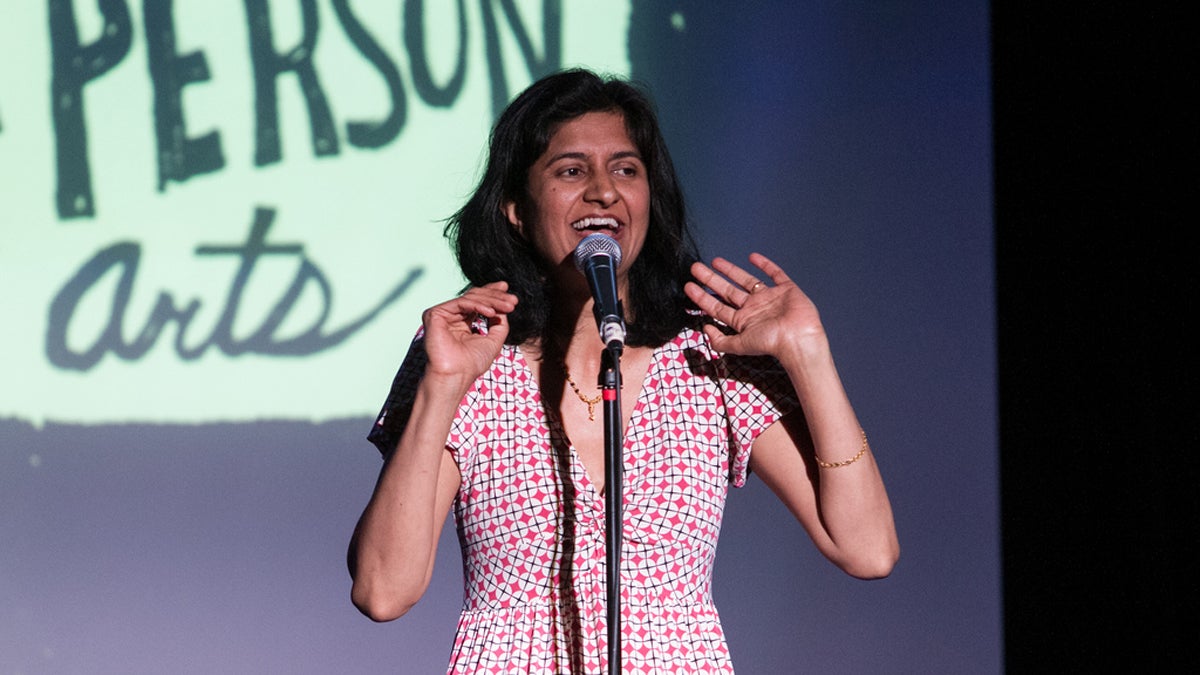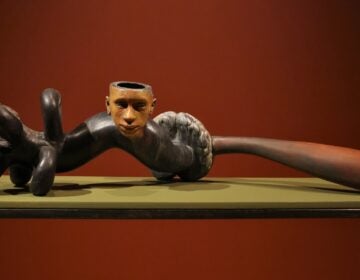Teen spirit takes an unexpected turn
Listen
Nimisha Ladva at a Story Slam April 2013. (Jen Cleary/for First Person Arts)
When you say “teen spirit,” what comes to mind? Energy, enthusiasm, or perhaps recklessness? Those traits certainly, but not always “kindness.” At a recent First Person Arts Story Slam, participants offered tales on the theme of “teen spirit.” Nimisha Ladva recounted an episode in her life where the teen spirit at a party took an unexpected turn.
Nimisha grew up in the U.S. in an Indian immigrant family, with parents bent on protecting her from the dangers of permissive American culture. “This meant that I was seriously not popular, and didn’t get invited to much,” she recalls. So when classmates held a co-ed swim party for the entire 10th grade, she had to navigate the restrictions of her family and her lack of experience with American teen fashion and society.
NewsWorks presents this story as part of “Story Corner,” a monthly series on NewsWorks Tonight. Becca Jennings of First Person Arts tells us that Nimisha received perfect scores for this one — “Not something we see very often,” she said.
Listen to her story above and read a transcript here:
I believe that there is a secret, unseen force that protects the fragile teen spirit. How do I know this? Let me tell you a story.
I grew up in a very strict, very conservative, Indian immigrant household. This meant, among other things: All my clothes were purchased at Sears on the sale rack; everything I wore had a very high neck and a very low hem; I didn’t own jeans until 8th grade; and — true fact — I always smelled a little bit like curry.
Truth.
This meant that I was seriously not popular, seriously not trendy. So I didn’t get invited to much. In 10th grade, however I did get an invitation.
Julie and Charles are brother-sister twins. And they’re having a party, and they invite the whole class. And I’m so excited, but it is a co-ed swim party.
This poses some challenges: One, I don’t own a swimsuit. I haven’t worn one since I was 7 years old. Two, my parents are not going to like the idea of young people wet, kind of naked, together, not doing their homework on a school night. And my mom wants to come with me.
So she says, “Oh, Nimisha. I’ll drive you. I can teach Julie’s mother how to make samosas. All people, they love the Indian food nowadays. I’ll just be teaching her samosas; you girls play in the water.”
This is code for in-situ surveillance. I know this. She knows this. We’re playing our game. This is how it works out.
My friend, who is Chinese-American — her mother offers to drive. My mom assumes that Mrs. Chen is as conservative as she is because she’s another Asian mom fighting against America. So she assumes that Mrs. Chen is going to, like, sit in the pool with us, holding our hands. I don’t say anything about that.
And I borrow a swimsuit. I borrow my first piece of real American clothing. And I know that if I show up wearing this thing, I will finally be accepted as normal, and I can be accepted and happy.
So this is what I do: I put the swimsuit on, I have some layers on top, some Sears clothes on top. We get to the party, I take off the layers, and — I’m not kidding — the magic is immediate. People who don’t talk to me ever: “Hey, Nimisha, nice suit.”
“Thank you.”
“Hey, Nimisha. Looking good.”
“Thanks.”
I have never felt this good. It gets better.
I sit at the edge of the pool. I put my feet in the water. I’m splish-splashing. Charles — the boy whose party it is — he’d seen me walk in and make my entrance. His eyes have followed me the entire way. He sits next to me. I have never been happier in my life. He leans in. This is what he says:
“Hey, Nimisha. How come you’re still wearing your bra and underpants with your one-piece?”
Oh my god! In my haste and inexperience, I totally blew it. I’m mortified beyond belief. I get up. I’m crushed under the heel of teenage angst. And I’m sort of like hobbling over to the bathroom. I get over there. I fix my wardrobe malfunction. I get out. I sit basically the rest of the party in this dome of just, like, sad despair.
I hated Charles that day. And I was scared of him ever since in high school. I’ve never talked to him since.
As an adult, however, I look back on that moment, and I notice three things. One, he could have shouted my problem across the entire pool and, like, had a more public thing. He could have swaggered over, like, with his other guy friends. He didn’t do that either. And he saw that I had a problem, and he took it upon himself to give me the information necessary to make it better. In short, he was actually as kind as he could have been.
So what is the unseen force that protects the teen spirit? It is a million acts of kindness, large and small, conscious and unconscious, visible only in hindsight.
One’s perspective changes so much between childhood and adulthood. And those high school experiences stay, it seems, with us forever. But as adults, we gain some distance and clarity and, whether we admit to it or not, we are able to see those terrible days of adolescence a little differently.
We caught up with Nimisha Ladva to see how her perspectives have changed — and how they’re stayted the same.
Was that your last pool party of high school?
First and last.
Have you been in touch with many of the people from your high school? Do you have any friends as an adult from those days?
I have moved many times since high school and not kept in touch. However, the one friend I still have from that time in my life is the Chinese-American friend I mention in the story. We really went through the worst of high school together. What’s funny is that we have always referenced our shared past as a keystone of our friendship. However, when she heard this story, she didn’t remember it all the way I did!
What is your attitude toward swimsuits today?
I’ve inherited my parents’ “coverage” regime: The higher the neck and the lower the hem, the better! Really!
As an adult, do you still eschew the Sears sales rack?
Yes. But my parents do not. When they see a really good deal on something that might fit anyone in the family, they get it. Now, I am not the only one who gets clothes this way from them. My children do, and so does my husband. He has a cowboy shirt from them that he could tell you about. It’s actually very sweet of them.
Can you think of any other instances when your teenage self was terribly upset by something you can now look back on and see as being not so bad or, as in the case with Charles, actually an act of kindness?
From my adult perspective, I have much more compassion for the limited perspective I had and that most of the teenagers around me had. This means that some things were not as bad and some things were actually worse, but that we were all very limited in what we were able to say and do. Two examples come to mind.
I joined the track team in 11th grade. I just walked on; there were no try-outs. I used to live in England, and when I was about 11 years old there, I once jumped really high on the high jump during P.E. This seemed to me enough experience to warrant joining the high school team in the U.S. I was frankly oblivious to the competitive nature of American high-school sports.
I went to about four practices and did badly at everything. At the fifth one, the coach took me aside and asked me not to come to the first meet and to consider spending my after-school time doing something else. He really meant doing anything else. I was devastated. But he was right. I would have been more embarrassed to run at the meet and not even be able to finish a race. He had been kind.
But there is a flip-side to the limited teenage perspective that I for one definitely had and which is more uncomfortable to talk about. I remember there was an African-American girl in many of my classes, and people were out-and-out cruel to her. It was naked racism. While I did not participate and was friendly towards her, I did not intervene or seek her out as a friend. I wish I had. She eventually moved to another school. I hope she was the beneficiary of acts of kindness outside of high school and later in life.
—
Nimisha Ladva is an award-winning writer and storyteller. Her short stories have been published in the U.S. and U.K. In 2013 she was the “audience favorite” at First Person Arts’ “GrandSlam” storytelling contest. Born in Kenya, raised in England, and educated in California, she now lives outside of Philadelphia.
To find out more about story slams, visit www.firstpersonarts.org.
WHYY is your source for fact-based, in-depth journalism and information. As a nonprofit organization, we rely on financial support from readers like you. Please give today.




